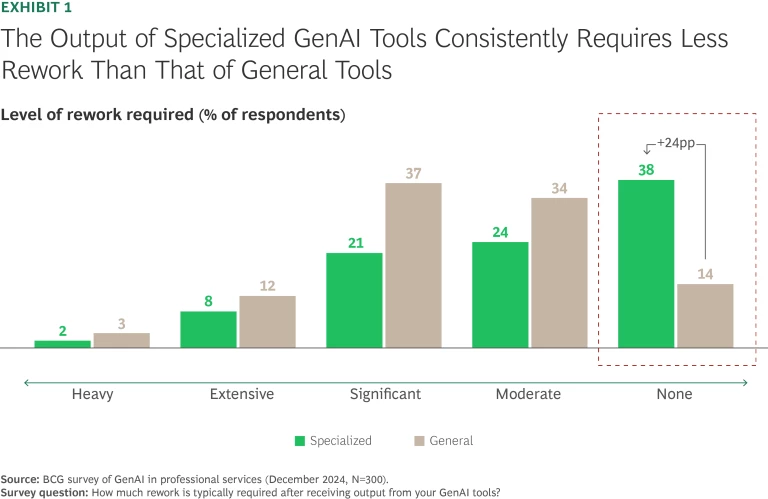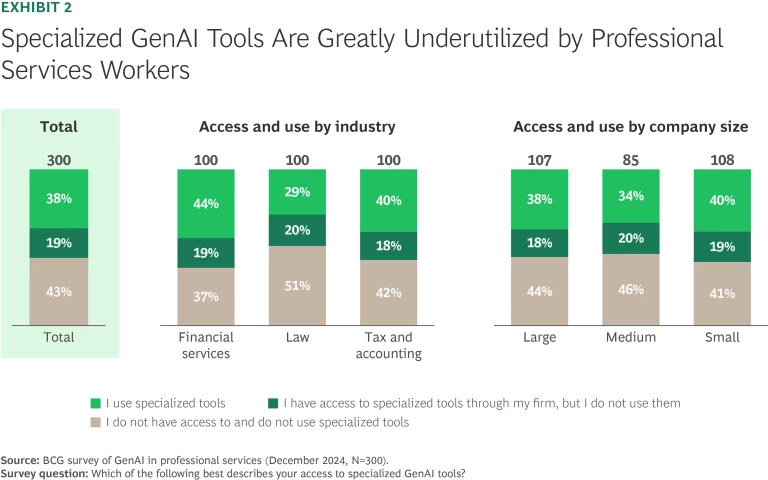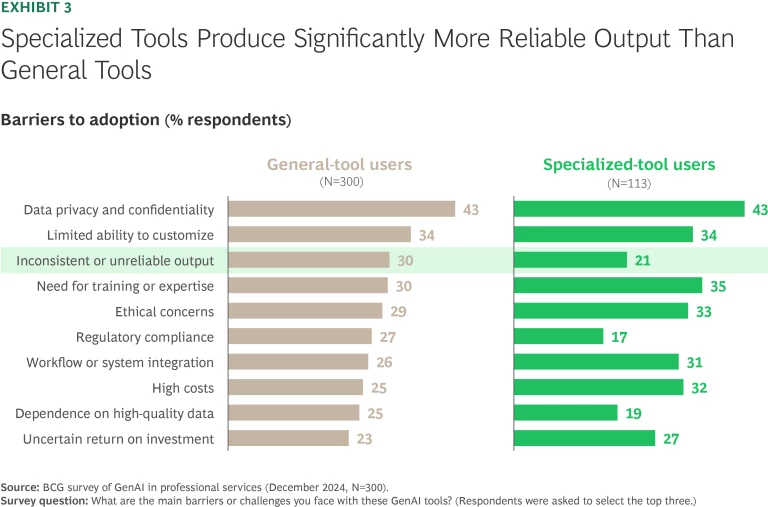New industry-specific generative AI (GenAI) is emerging with the potential to deliver tremendous benefits to professional services workers. These specialized tools have demonstrated an ability to provide greater time savings, richer insights, and more useful output than general-purpose tools like ChatGPT.
Our research finds that, despite this potential, less than 40% of legal, financial, and tax and accounting professionals use these possibly game-changing tools. Various issues, including data privacy, limited customizability, and the need for training, have stood in the way.
Now is the time for information services providers and professional services firms to seize the specialized GenAI opportunity. Information services companies need to continue improving the new tools’ functionality while working closely with professional services customers to boost adoption rates. Meanwhile, professional services firms need to prepare their data and workforce to leverage this functionality as it grows.
GenAI in Professional Services Work Today: Key Survey Findings
To better understand how professional services firms are deploying general and specialized GenAI, BCG conducted a survey of 300 workers at US legal, financial, and tax and accounting firms in late 2024. The responses yielded important findings about the benefits and limitations of these tools.
General GenAI Tools: Baseline Functionality, Modest Impact
The popularity of general GenAI has grown rapidly among professional services workers in recent years.
Mostly free and widely available, general GenAI platforms enjoy widespread use among professional services workers. The companies that release these tools—large AI labs such as OpenAI, Microsoft, and Google—are focused on advancing the frontiers of AI research while reaching the largest number of users possible.
Our survey found that the popularity of general GenAI has grown rapidly among professional services workers in recent years. Today, 95% of survey respondents use GenAI at least once a month in their work. Approximately 86% use it somewhat or much more frequently now than 12 months ago. The most popular tool by far is OpenAI’s ChatGPT: nearly 80% of respondents use it, and 10% do so exclusively.
General GenAI tools are typically used for basic tasks like email writing, so the impact on workflows has been good but not remarkable. For 53% of respondents, time savings are less than 25%, and for 15% of respondents, time savings are less than 10%—clearly not transformational for tasks that can be completed relatively quickly.
General GenAI output also tends to require human refinement. Many respondents indicated that general GenAI output still lacks accuracy and deep insights—and most said that it needs substantial rework.
Taken together, these findings suggest that professionals do not derive significant time or quality benefits from general tools. Nor is this likely to change in the near future: respondents think that GenAI will provide greater time savings over the next two to three years but not enough to fundamentally reshape their roles.
Specialized GenAI Tools: Better Performance, Higher Impact
In the future, professional services workers anticipate using GenAI for tasks that support core value creation.
Specialized GenAI takes the capabilities developed by the largest AI labs and optimizes them for specific domains and use cases. BloombergGPT, Lexis+ AI, and QuickBooks AI features are tools that have been developed for professional services firms.
Unlike general GenAI, specialized solutions focus the capabilities of large language models (LLMs) on high-quality, domain-specific content to generate more-accurate output. Moreover, because specialized GenAI tools are often designed to integrate with specialized software, they can help reduce the number of steps in the workflow. Users thus can stay on one platform, without having to export and import files, copy-paste, or contend with other points of friction that waste valuable time.
Our findings indicate that specialized tools perform substantially better than general GenAI on nearly every dimension—not only time savings but also accuracy, scope, and richness of insights. One especially telling metric concerns the amount of “rework” needed. The number of general-tool users who said that output required significant or extensive rework outnumbered specialized-tool users considerably (49% versus 29%). Moreover, only 14% of general users reported that the output requires no rework, versus 38% of specialized users. (See Exhibit 1.)

The data also yields some valuable insights into how professionals use specialized GenAI. Of the respondents, 80% said they use these tools “often” or “very often” for consulting internal documents. Only 35% of respondents use general GenAI for this purpose. This statistic underscores the need among professional services firms for solutions tailored to the types of documents, language, and context of their industry.
In the future, professional services workers anticipate using GenAI for tasks that support core value creation. For example, the percentage of financial services respondents expecting to use GenAI for quantitative analysis is about triple the average across industries (54% versus 18%), and the portion of legal services respondents expecting to use GenAI to draft contracts is nearly double (25% versus 14%).
The Adoption Challenge
Despite the benefits of specialized GenAI, uptake is far from pervasive among professional services workers. Only 38% of all survey respondents across professional services sectors deploy these tools, while another 19% have access to such tools at their firm but do not use them. That means that more than 60% of professional services workers do not use specialized GenAI, either because they choose not to or because they simply lack access. (See Exhibit 2.)

The survey indicates that some major barriers stand in the way. (See Exhibit 3.) Data privacy and confidentiality challenges—concerns that any data used with the product may be leaked or put to work training LLMs—are by far the top impediment for both general and specialized users. Limitations in users’ ability to customize the tools are also a hurdle for both groups. But the issue of inconsistent or unreliable outputs, a top challenge for users of general tools (cited by 30%), is far less of a concern for users of specialized tools (cited by only 21%). The same holds true for regulatory compliance (27% versus 17%). These data points support our findings that specialized tools provide better accuracy for industry-specific use cases, lowering the amount of rework and inspiring greater user confidence.

Our client work has uncovered another issue that can hinder the adoption of specialized tools. The decision to use them is typically up to the organization or team, not the individual, because everyone needs to use the same tools for effective collaboration. This means that makers of specialized tools, as well as firms that want to encourage their workers to use them, should approach adoption as an enterprise-level change.
Subscribe to receive the latest insights on Technology, Media, and Telecommunications.
Putting the Survey Findings to Work
Although specialized GenAI tools exhibit significantly better performance, they remain underused by professional services workers. Here are some steps that professional services firms and information services companies can take to drive adoption.
Professional Services Firms
Ensure that your data and content are AI-ready. If an organization intends to use GenAI on first-party data and content, it should consider setting up data and content pipelines in advance. This work, which includes defining a data model, creating databases, and cleaning and labeling data, is considerable but is well worth the effort.
Encourage use by individuals and teams alike. Isolated experimentation by early adopters can surface new tools and use cases, while enterprise-wide programs are needed to realize the full potential of GenAI-enabled workflows.
Consider usability and workflow impacts. A specialized tool that plugs into an existing solution may require little training, but a transformed workflow that replaces many of the tools and processes that workers are accustomed to using may require significant upskilling and change management.
Listen to and address employees’ concerns. Employees may be apprehensive about data privacy, the ethics of using AI, and the technology’s implications for the future of their profession. These are legitimate worries and need to be treated as such.
Information Services Companies
Highlight the advantage of specialized tools. Compared with general GenAI, specialized tools offer substantially better output accuracy and time savings, resulting in less rework and lower costs.
Elevate specialized GenAI to the enterprise level. While general GenAI assists individuals in completing basic tasks, specialized tools can help companies reengineer core processes involving multiple-user workflows—and deliver step changes in cost and efficiency.
Address data privacy concerns head-on. Incumbent information services companies should not be shy about conveying their advantages over hyperscalers and startups when it comes to data privacy and confidentiality. Incumbents have long had regulatory controls in place, so they are more trustworthy than hyperscalers mired by copyright lawsuits or new players that lack a track record.
Set customers up for success. Given the need for specialized training and customizability, information services companies cannot simply release features and hope for the best. They have to take a hands-on approach to supporting adoption at the individual, team, and organizational levels. This means working closely with customers to understand pain points in current workflows and support upskilling.
The advent of specialized GenAI tools presents a major opportunity for both professional services firms and information services providers. Companies that act now will be best positioned to benefit as GenAI becomes increasingly specialized—and integral to professional services workflows.
We thank our colleagues Lauren Hawkins, Rachel Kellerman, Riccardo Mastellone, and Tim Nolan for their contributions to this article.









